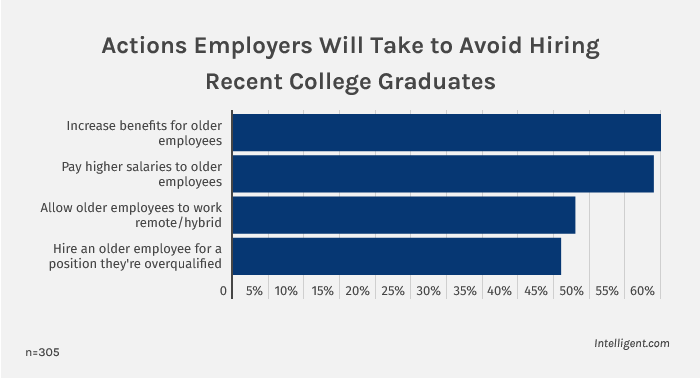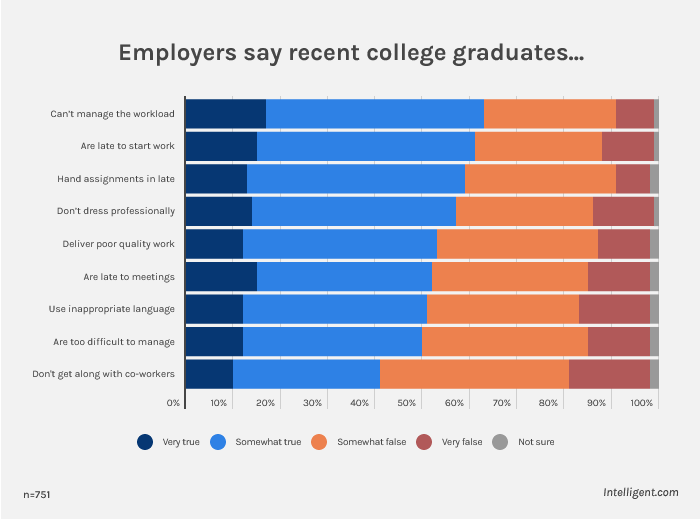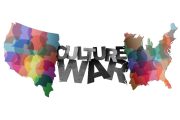
It turns out that just about everything everyone thinks about young folks called Gen Z is true.
They don’t like to work. The internet has rotted their brains and ruined their ability to communicate with human beings. And they are social-justice snowflakes. The prospect of melting in a possibly tough situation is high. Some take parents to job interviews.
Born between 1996 and 2010, Gen Z is such a mess that employers are seeking, and hiring, older folks.
That news surfaced in a late-December report from Intelligent.com that’s just now getting legs. Combine that with the recent frightening finding that the vast majority of Gen Z is unfit for military duty, and one must conclude that the future is bleak.
The Survey
The website surveyed 800 managers last month about Gen Z job candidates. The managers are not impressed, despite the ubiquitous presence of Gen Z social-media “influencers” who purport to be smarter than Aristotle.
The key findings won’t shock anyone with a passing familiarity to the Gen Z cohort, much of which was raised not by parents but by social media:
- 38% of employers avoid hiring recent college graduates in favor of older employees
- 1 in 5 employers have had a recent college graduate bring a parent to a job interview
- 58% say recent college graduates are unprepared for the workforce
- Nearly half of employers have had to fire a recent college graduate
Finding 1: “Employers offer older workers better pay, increased benefits to avoid Gen Z college graduates”
Gen Z employees are such a pain that employers simply don’t want them. And they “implement a variety of different tactics to avoid working with recent college graduates,” the report says. Sixty percent offer better benefits and 59 percent pay higher wages. Almost 50 percent permit older workers to work remotely.

Another 46 percent would rather hire an overqualified oldster “to avoid working with someone younger.”
Finding 2: “Unreasonable salary demands, lack of eye contact top list of interview blunders for recent college grads”
Again not surprisingly for anyone familiar with Gen Z, 20 percent of employers say the youngsters “are unprepared” for interviews, the “biggest offense,” 53 percent said, “is that recent college graduates struggle with eye contact during interviews.
Maybe spending 12 hours a day staring at “influencers” on X, TikTok, Instagram, and Facebook isn’t such a bright idea after all, but anyway, another big problem is what the entitled brats expect: too much money. Fifty percent of employers said that Gen Z candidates ask for ridiculous salaries.
And again, of course, they don’t know how to dress for an interview and turn up inappropriately attired.
“Recent college graduates still seem to struggle with professional behavior” even in online interviews:
Twenty-one percent of employers have had a candidate refuse to turn on their camera for a virtual interview, while 19% say they’ve even had a recent college graduate bring a parent with them to their interview.
Finding 3: “2 in 3 employers say recent college grads can’t manage their workload”
Aside from that unsurprising datum, Gen Z employees are often late for work, 61 percent of managers said. Another 53 percent said they show up late for meetings.
More than 50 percent of managers said Gen Z employers dress inappropriately and turn in poor quality work. More than 40 percent say they can’t get along with coworkers.

Finding 4: “Recent college grads are entitled, 63% of employers say”
That finding, too, is not surprising, and correlates with the 58 percent of managers who said Gen Z employees are easily offended and “overall unprepared for the workforce.”
Another 57 percent said Gen Z are “lacking professionalism,” 55 percent said those employees don’t react “well to feedback,” and 52 percent said they have “poor communication skills.
Actress Jodie Foster summed Gen Z up this way:
They’re really annoying, especially in the workplace. They’re like, “Nah, I’m not feeling it today, I’m gonna come in at 10.30am.“ Or in emails, I’ll tell them this is all grammatically incorrect, did you not check your spelling? And they’re like, “Why would I do that, isn’t that kind of limiting?”
Can’t Serve in the Military
Intelligent.com’s findings comport with a McKinsey & Co. report that defines Gen Z:
Gen Zers — speaking generally — are extremely online. Gen Zers are known for working, shopping, dating, and making friends online; in Asia, Gen Zers spend six or more hours per day on their phones.
Video-sharing social media sites have seen a meteoric rise as Gen Z comes of age. TikTok currently rules trends, feelings, and culture for Gen Zers, who make up 60 percent of the app’s one billion-plus users. Gen Zers flock to corners of the internet where they can discuss their passions and interests with those who share them — from gaming to K-pop — bonding with both people they know in real life and ones they’ve only met online.
Gen Z is also crazy, McKinsey reported. It “faces an unprecedented behavioral health crisis. US Gen Zers surveyed by McKinsey report the least positive outlook and the highest prevalence of mental illness of any generation, and European respondents report struggling with self-stigma.”
Gen Z is obsessed with “racial justice” and the imaginary problem of climate change, and the “unprecedented behavioral health crisis” showed up in a study from Pew Research. “With one exception (white moderates),” the Manhattan Institute’s Zach Goldberg reported of the study, “those in the 18-29 age group are more likely to report being diagnosed with a mental health condition. The differences among white liberals, though, are striking: almost half of white liberals in this cohort report a diagnosis.”
On top of that, add this: In 2020, the Pentagon found 77 percent of American ages 17-24 — the Gen Z cohort — can’t serve in the military because they are either fat, crazy, or drug addicts.
“When considering youth disqualified for one reason alone, the most prevalent disqualification rates are overweight (11%), drug and alcohol abuse (8%), and medical/physical health (7%),” the report revealed.
H/T: Ace of Spades, New York Post



